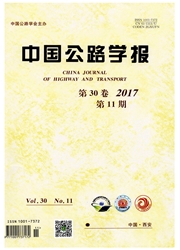

 中文摘要:
中文摘要:
为了明确生物能源副产品木质素在道路工程土体加固领域的研究现状,根据国内外大量文献中有关木质素加固土体的相关报道,对木质素与土体之间的相互作用机理进行了综述,并对比了各种固化机理模型,总结了国内外评价木质素加固土性能的方法和相关典型室内试验结果,同时论述了木质素加固土的抗侵蚀特性,归纳了木质素加固土抗侵蚀特性的室内试验方法。分析结果表明:生物能源副产品木质素是一种具有工程应用前景的土体固化添加剂,具有环境友好、成本低廉等特点;木质素加固土在力学特性和抗侵蚀特性等方面均表现优越;木质素与土体的相互作用机理和加固土的耐久性能仍需要进一步试验研究与验证;关于木质素加固土的现场施工工艺和效果评价尚缺少相关研究,有待开展此方面的研究工作。
 英文摘要:
英文摘要:
In order to find out the present state of soil stabilization with lignin from bio-energy by- products in road engineering, a large number of literatures which had reported soil stabilization with lignin were reviewed to study the interaction between lignin and soil. The performances of various models for stabilization mechanism were compared. The methods for evaluating the performances of lignin treated soils and the results of typical laboratory tests were also summarized. The erosion resistance characteristics of lignin treated soils were discussed and the various laboratory test methods to evaluate the erosion resistance of treated soils were summarized. The results show that lignin from bio-energy by-products is an environment friendly, low-cost soil additive which has a great potential to stabilize soil in civil engineering. The performance of lignin treated soil on mechanical properties and erosion characteristics are better than natural soil. The interaction mechanism between lignin and soil and the durability of treated soil still need to be investigated and verified with additional laboratory tests. On-siteconstruction technology and effect evaluation of lignin treated soil are lack of relevant studies and these researches should be carried out in the future.
 同期刊论文项目
同期刊论文项目
 同项目期刊论文
同项目期刊论文
 Consolidation parameters interpretation of CPTU dissipation data based on strain path theory for sof
Consolidation parameters interpretation of CPTU dissipation data based on strain path theory for sof Assessment of stress history of Jiangsu clay deposits from seismic piezocone penetration testing (SC
Assessment of stress history of Jiangsu clay deposits from seismic piezocone penetration testing (SC Stabilization Mechanism and Effect Evaluation of Stabilized Silt withLignin Based on Laboratory Data
Stabilization Mechanism and Effect Evaluation of Stabilized Silt withLignin Based on Laboratory Data Evaluation of geotechnical parameters of a lagoonal clay deposit in Jiangsulixia river area of China
Evaluation of geotechnical parameters of a lagoonal clay deposit in Jiangsulixia river area of China 期刊信息
期刊信息
